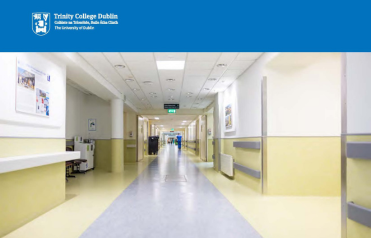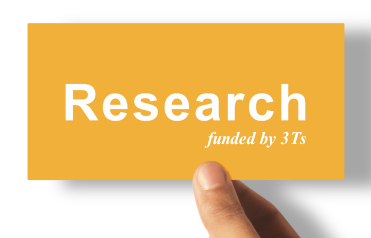
The Experiences & Support Needs of Family/Supporting Adults Who Accompany Someone to the Emergency Department with Self-Harm, Suicide-Related Ideation or Suicide Attempt
Phase 2 Study Findings
72% of families & carers received no suicide prevention guidance after a loved one presented to an Emergency Department.
Background
The Emergency Department (ED) is often the first point of contact for people experiencing self-harm or suicidal thoughts. In Ireland in 2021, there were 11,415 ED presentations for self-harm, with many more presenting with suicidal ideation.
After discharge, families & carers are typically left to manage patient safety — yet few receive guidance on how to do this.
While the National Clinical Programme for Self-Harm & Suicide-Related Ideation (NCP-SHI) highlights the vital role of carers, no Irish study had systematically explored their experiences until now.
This Phase 2 study, conducted by Trinity College Dublin in partnership with 3TS, addressed that gap.
"Families play a critical role — both in the ED & after discharge — but are often left in the dark. Simple steps such as providing a safety plan & clear guidance could save lives."
— Professor Louise Doyle, lead researcher
Headline Findings
- 72% of carers received no information on suicide prevention
- 71% received no guidance on supporting the person after discharge
- 72% said no safety plan was developed for the patient
- Over half felt staff lacked the skills & confidence to care for suicidal patients
- 68% reported that a mental health assessment was carried out — but over one-quarter said no assessment was offered, or the person left before being seen
- The ED environment was often unsuitable: noisy, crowded, with long waits & little privacy
"Tragically, some participants lost their loved one to suicide after the ED visit — and felt this might have been preventable with better services. We believe a dedicated, 24/7 Suicide Emergency Department is urgently needed."
— Noel Smyth, Chairman 3TS
Study Methods
- Design: Exploratory qualitative online survey, co‑developed with two PPI contributors
- Participants: Adults (18+) who accompanied someone to an Irish ED for self-harm, suicide attempt or suicidal ideation within the past five years
- Recruitment: Online & social media platforms via mental health organisations
- Analysis: Content analysis of open-ended responses
- Ethics: Approved by Faculty of Health Sciences Research Ethics Committee, TCD
Sample Profile (n = 239)
- Gender: 88% female
- Age: 18–81 (mean = 43)
- Relationship to Patient: Parents of adults (22%), parents/guardians of minors (21%), siblings (16%)
- Location: Dublin EDs (34%), broader Leinster (24%)
- Presentation Reasons: Suicide attempt (56%), suicidal ideation (52%), self-harm (38%)
Detailed Findings
Patient Assessment in the ED
- 68% reported that a mental health assessment was carried out
- 52% of carers were included, mostly to provide collateral history
- Inclusion led to better understanding, communication & joint decision-making
- Exclusion resulted in gaps in information & reliance on possibly minimised patient accounts
Safety Planning
- 72% reported no safety plan was developed
- Of those with a plan, only 46% of carers were involved
- Carers strongly wanted jointly created safety plans linking to aftercare
ED Environment & Staff Interactions
- Challenges: Long waits, unsuitable physical spaces, focus on medical stabilisation over psychological needs, occasional negative attitudes
- Positive experiences: Some reported compassionate, skilled care — e.g. where Clinical Nurse Specialists (CNS) were involved
Information & Support on Discharge
- 72% received no suicide prevention materials
- 71% received no guidance on how to support the person after discharge
- Desired content: Clear advice on warning signs, support strategies, emergency contacts & follow-up pathways
Carer Recommendations for Improvement
- Improve staff education on self-harm & suicide empathy
- Always treat patients & carers with respect & attentiveness
- Ensure availability of specialist mental health staff in EDs
- Provide sensitivity training & promote non-judgemental communication
Recommendations for Practice
Standardised Assessment & Care Planning
- Fully implement NCP-SHI principles across all EDs
- Guarantee mental health assessments for all self-harm/suicidal presentations
- Involve carers in assessment & safety plan development
Compassionate Staff Interactions & Training
- Promote compassionate, non-stigmatising language in all ED interactions
- Provide ongoing staff education on brief-interaction empathy & suicide awareness
Information Provision & Aftercare Support
- Supply clear verbal & written guidance to carers covering:
- Warning signs
- Support strategies
- Emergency contacts
- Aftercare pathways
- Format materials in plain English & suitable for varied literacy levels
About the Authors
Prof Louise Doyle, Dr Brian Keogh, Dr Jean Morrissey, Mr Ciarán Carr
Contact: louise.doyle@tcd.ie
.png?sfvrsn=c7f3f24a_0)
